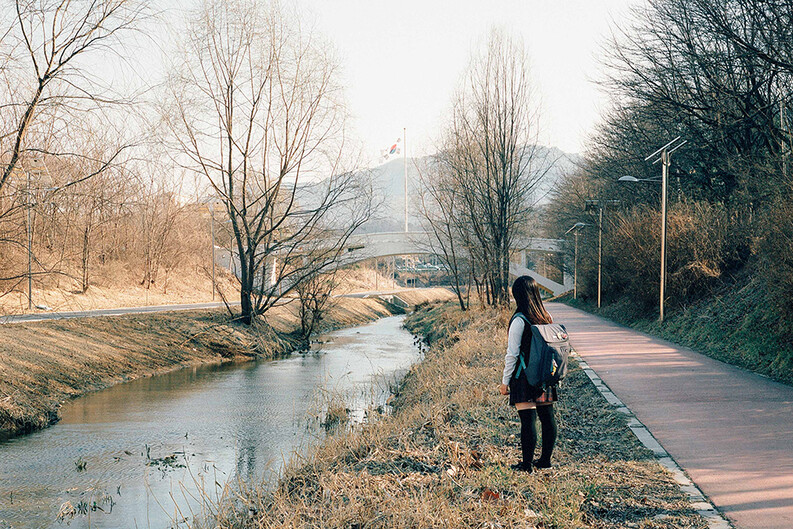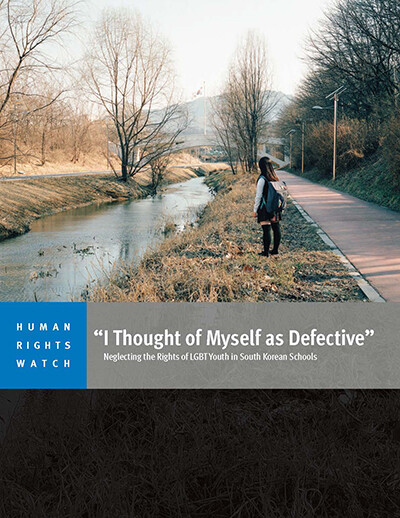Lowenstein Clinic Students Research the Experiences of LGBT Youth in South Korea

A September report jointly authored by Human Rights Watch and the Lowenstein International Human Rights Clinic at Yale Law School begins with the story of Park Beom-seok. The now 22-year-old gay man first thought he might be gay at about age 11, but homophobic bullying and a total lack of discussion around LGBT issues caused him to hide his identity. “There was no system which supported me,” says Park Beom-seok in the report.
That insight into the life of a young LGBT person in South Korea comes out of research first begun in March 2019, when students from the Lowenstein Clinic traveled to South Korea and spent a week interviewing recent high school graduates like Park Beom-seok, current students, high school teachers and counselors, parents, advocates, and other experts. The experiences of the individuals they met and interviewed form the basis for the new report on the rights of LGBT youth in South Korea.

The joint report, titled “‘I Thought of Myself as Defective’: Neglecting the Rights of LGBT Youth in South Korean Schools,” documents bullying and discrimination against South Korean LGBT youth. LGBT youth often struggle with mental health issues due to their harassment and isolation, the report finds, and, as a result, experience significant disruptions in their learning. In spite of these dangers, the South Korean government has neglected to implement any protections for LGBT youth; in some cases, it has actively fostered discrimination, according to the report. The National Assembly of South Korea has yet to approve a comprehensive anti-discrimination law for LGBT people. Meanwhile, it has excluded discussions of LGBT people from sexual education curricula, funded mental health programs in which counselors have discouraged students from being LGBT, and made it difficult for transgender students to attend school consistent with their gender identity, the report’s authors find.
LGBT youth are quoted extensively in the report, describing the impact of this environment. Looking back on her time in high school, 24-year-old lesbian Cha Ellen remembered, “I thought I’m flawed. I thought, why should I live like this, and why can’t I like boys? At the time, I felt depressed. It was a year and a half, feeling that.”
Carolyn O’Connor ’19, a past member of the Lowenstein clinic involved in the research said, “In interview after interview, we heard how LGBT youth in Korea are routinely and systemically failed by the government and their schools, whose silent refusal to protect the fundamental rights of LGBT youth teaches the erroneous and destructive lesson that discrimination is right.”
Prior to leaving for South Korea to conduct these interviews, the Lowenstein clinic team developed their initial questions through background research and reached out to South Korean LGBT organizations, including student groups, to recruit interviewees. The team found that reaching out to organizations through less traditional methods, such as KakaoTalk and Facebook, was more effective than emailing or calling.
In South Korea, the team conducted three to six individual or group interviews per day, which could last anywhere from one to three hours. Collaborating with South Korean advocates made the interviews possible, according to the clinic students. Advocates were instrumental in securing the interviews through their networks, and one longtime bilingual LGBT activist provided essential interpretation services during the clinic students’ week of interviews. Between the Lowenstein clinic team and later follow-up work by Human Rights Watch researchers, the report was based on 67 interviews with 26 students or recent graduates and 41 teachers, counselors, administrators, parents, advocates, and other experts.
“I am grateful to the brave LGBT students and activists who shared their experiences with our team,” said Edgar Melgar ’21, another clinic member. “Through the report we tried to convey their resilience in the face of widespread bullying and discrimination.”
The team made sure to build time for recovery into their schedule, visiting museums and food markets in time between interviews. “It was special to be part of a team that explored self-care as an intrinsic aspect of human rights work,” said O’Connor, “both learning from the people we interviewed about their self-care practices to preserve themselves against constant discrimination and harassment as well as finding our own tools to work through the vicarious trauma from the interview process.”
Upon the team’s return to Yale, they reviewed their extensive notes and began the process of developing the recommendations that appear in the report. “We developed our recommendations largely by listening to what we were told in interviews with individuals and organizations working on the ground in South Korea,” said Dylan Kolhoff ’19. “By combining what we were told with the acknowledged state of the legal framework in South Korea, we developed recommendations for how the state and school officials could protect LGBT youth.”
Human Rights Watch released the report on Sept. 14, 2021, sharing the findings and recommendations developed jointly with the Lowenstein Clinic. Along with the report, individual stories of LGBT youth interviewed for the report are published on Human Rights Watch’s website. The stories highlight the young people’s hope for a better future. One has started a YouTube channel dedicated to normalizing LGBT identity. Another plans to become a teacher, hoping to provide the support to LGBT students he did not receive growing up.
A young transgender man mentioned the possibility of passing an anti-discrimination law, the report’s key recommendation to the South Korean government. There has been no progress yet on passing such a law through the National Assembly — but he still has hope.
The Allard K. Lowenstein International Human Rights Law Clinic is a legal clinic at Yale Law School that undertakes projects on behalf of human rights organizations and individual victims of human rights abuses.


